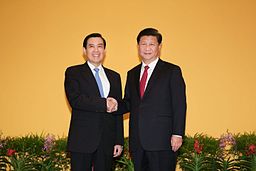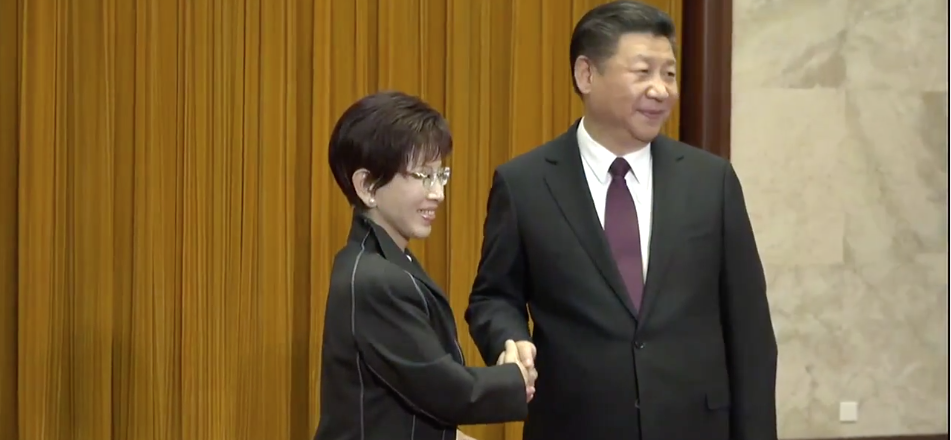A nation must think before it acts.
Desperate for Attention: Hung-Xi Meeting Lacks Meaning
On November 1, 2016, Hung Hsiu-chu, chairwoman of the Kuomintang (KMT), met with Xi Jinping, General Secretary of the Communist Party of China (CCP), at an annual forum between the KMT and CCP. This meeting received much fanfare in the media. The amount of attention that this photo op received may seem puzzling: Hung is not the president of Taiwan; she was such an unappealing presidential candidate that the KMT replaced her three months before the election; and the KMT does not hold the presidency or legislature making it the opposition party for the first time in Taiwan’s history. Hung kept floating the idea of promoting a “peace platform” even though she lacks any authority or mandate to negotiate or sign an agreement between Taiwan and China. In fact, it would be illegal. The Hung-Xi meeting only holds ceremonial importance, but even that characterization is a stretch. It has been incorrectly framed as another historic Ma-Xi meeting. That handshake represented years of negotiating, and having the sitting leaders of Taiwan and China finally meet marked a potential new chapter in cross-strait relations. That much hoped for chapter never materialized due to the KMT’s electoral collapse, and framing the Hung-Xi meeting in the same context does disservice to the historic nature of the meeting in Singapore last year.

For Hung, it is a desperate headline grab that will further alienate the KMT from the populace, and for Xi, it is an attempt to embarrass President Tsai Ing-wen, who has called for a resumption of “talks” between Taiwan and China. While this event does occur annually between the leaders of the two parties, the timing and circumstances for a peace deal are not right: Taiwanese identity is at an all-time high, and the historic election in January 2016 shows that the public mood is against further integration with China. If Hung wanted to push the KMT further away from the public and continue to lose elections, then she made the correct move. Her views on unification do not align with the broad base of the public’s, and they are so pro-China that it is one of the reasons the KMT replaced her when she ran for president in 2015. Why does Hung think that she has any legal or political mandate to even think about such a deal?
The way in which Hung acted before and during the “Cross-Strait Peace Development Forum” rankled members of both the KMT and DPP. Before the scheduled meeting, the ruling Democratic Progressive Party (DPP) publicly warned Hung not to address “politically sensitive” topics with Xi. After the meeting, DPP officials said that she let the nation down through her actions. She did not challenge Xi’s statements on “one China,” so the term “Republic of China” (Taiwan’s official name) was omitted from the record again. DPP officials also expressed worry about Hung trying to move towards a similar definition of “one China” with the CCP. New Power Party (NPP) chairman Huang Kuo-chang (a new party that formed after the Sunflower Movement) expressed his discontent with this meeting by saying that KMT was “toeing the Communist line of united front while distancing itself farther and farther away from mainstream Taiwan.” Also, before this meeting, KMT officials emphasized “one China, different interpretations,” which is former President Ma Ying-jeou’s preferred formulation. There are even reports that Hung argued with Ma over the 1992 Consensus and what “one China, different interpretations” means. If Ma—who advocated and maintained the status quo during his time in office—had to argue with her over the party’s interpretation of the 1992 Consensus, that shows how radical of a view she has.
As long as Hung controls the KMT, she could derail any chances that the party has of retaking major offices. The best hope for the party is that she gets ousted by a moderate member of the KMT so the party can work towards making meaningful policy changes that the public will accept. Hung and the KMT cannot hedge on a Tsai stumble or Chinese pressure to bring voters back into their ranks. This election solidifies a shift in Taiwanese political ideals, and the KMT must evolve to remain a viable party option. The party must move with the people, not vice versa. If ideologues like Hung continue to chair the party, create the platform, and pull stunts like the meeting with Xi, then the KMT is a lost cause.


